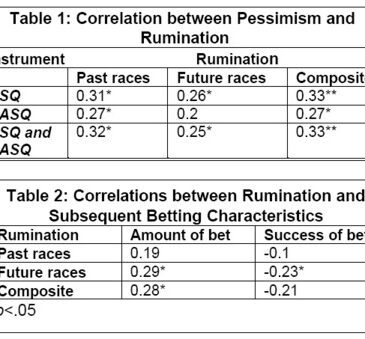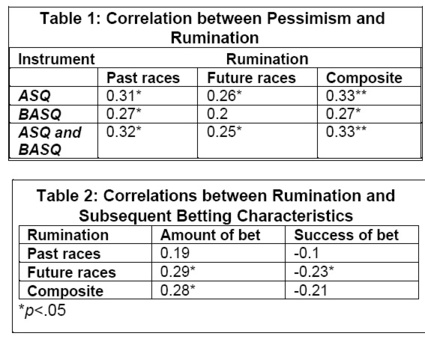Learned helplessness is the psychological condition that arises in a person who has repeatedly tried and failed to influence a particular outcome. For example, the student who consistently receives poor grades regardless of the magnitude of his or her efforts will eventually experience learned helplessness. It is a phenomenon that can produce profound effects on motivation, cognition, and emotion.* Since its formulation, helplessness theory has been studied in the context of depression, occupational performance, and physical health. Atlas and Peterson (1990)** used this paradigm to examine the explanatory styles of racetrack bettors. Their sample consisted of 53 harness track patrons who averaged 39 visits to the track each year. Subjects were asked to complete two instruments, the Attributional Style Questionnaire (ASQ) and the Betting Attributional Style Questionnaire (BASQ) to evaluate how they explained negative events. Higher scores on the scales indicate a propensity toward pessimism; that is, the tendency to explain misfortunes using stable, global, and internal attributions. Compared to optimistic counterparts, pessimists will view negative outcomes as permanent and sweeping. Subjects were then given a journal to record the following information for each race: 1) amount wagered, 2) a cause for the outcome of the race, 3) confidence in winning the next bet, 4) degree of rumination about past or future races. Selected results are listed in the tables below.
Table 1 reveals a moderate, yet generally discernible level of correlation between pessimistic tendencies and rumination about both past and future races. Table 2 takes this finding one step further, and presents a correlation between degree of rumination following a particular race and amount wagered on the subsequent race. Furthermore, an inverse relationship was discovered between rumination on future races and the success of the bet on the next race. Thus2, pessimistic tendencies are associated with rumination. Rumination is detrimental to the bettor’s decision making, leading to decreased success in future bets. It should be noted that not all of the relationships cited are strong, and not all are statistically significant. In addition, the authors of the present study set out to investigate pessimism and learned helplessness and not pathological gambling. Nevertheless, these findings suggest the relevance of helplessness theory to the cognitive and motivational functioning of gamblers. Epidemiology and neurobiology are critical to the understanding of pathological gambling, but the actual thought processes and mechanisms of the individual gambler should not be ignored.
Sources:
* Maier, SF, and Seligman, MEP. (1976) Learned helplessness: Theory and evidence. Journal of Experimental Psychology, 105, (1), 3-46.
** Atlas, GD, and Peterson, C. (1990). Explanatory style and gambling: How pessimists respond to losing wagers. Behaviour research and therapy, 28, (6), 523-529.
This public education project is funded, in part, by The Andrews Foundation and the National Center for Responsible Gaming.





